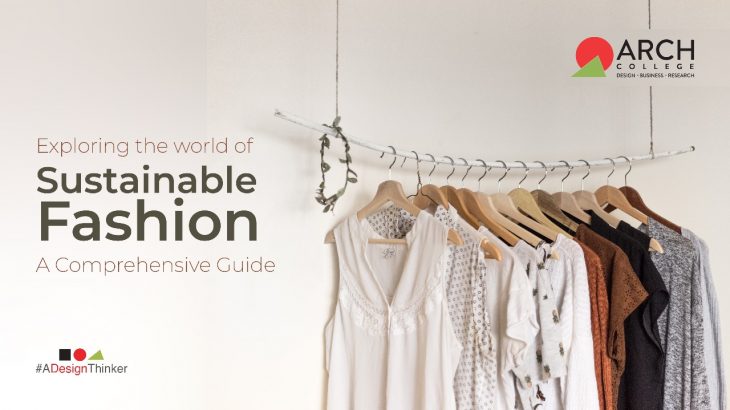Sustainability has become fashion’s ultimate status symbol! Sustainable clothes or garments are everywhere, gracing magazine covers and dominating runways and fashion conversations. But What’s the crux behind this burgeoning trend? Read on as we unwind the threads of sustainable fashion and break down the details of conscious clothing.
What Does Sustainable Fashion Mean?
The shift towards a greener mindset is making waves as we’re getting more concerned about how our clothes affect the environment. Sustainable fashion has been quietly gaining ground for the last decade, and it’s gearing up for a breakthrough.
In a nutshell, sustainable fashion is an ethical approach to designing, sourcing, manufacturing, selling, and delivering clothing in a way that minimizes industry wastage to control the negative impact on people and the planet, along the entire value chain. These pillars—cutting CO2 emissions, addressing overproduction, reducing pollution and waste, supporting biodiversity, and ensuring fair wages and safe working conditions for garment workers—compose the fundamental core of sustainable fashion.
Sustainability in fashion can be achieved through various, Mediums including the adoption of organic materials, the implementation of biodegradable dyes, and the creation of zero-waste patterns in designs. Additionally, reuse & recycling of materials and implementing eco-friendly manufacturing practices are key steps toward a greener industry.
Why is Sustainable Fashion Important?
The growth of industries, extensive production, and the use of synthetic textiles are negatively impacting our environment. This has led to a widespread conversation shift toward sustainable fashion. The excessive use of resources like water, energy, and various raw materials depletes natural reserves and generates substantial waste, adding pressure on ecosystems and waste management systems.
The industry’s success is increasingly overshadowed by its detrimental impact on the environment. Did you know that the world of fashion makes up 10% of humanity’s carbon emissions, dries up water sources, and pollutes 20% of rivers and streams, globally? What’s more, 85% of all textiles go to the dump each year (UNECE, 2018), and washing some types of clothes sends a significant amount of microplastics into the ocean.
Surprisingly, the majority of clothing is fashioned from plastic, potentially leading to a microplastic disaster. It’s high time for a global industry overhaul, with an emphasis on transitioning to sustainable fashion as the vital change.
How is Sustainability Impacting the Fashion Industry?
Fashion is frequently seen as a reflection and a trailblazer of culture. Right now, the industry has an unparalleled opportunity to prove that embracing creativity with respectful boundaries can truly drive authentic sustainability. For an industry long plagued by wasteful processes and detrimental environmental impacts, adopting sustainable practices presents a formidable challenge.
Recognizing the impact of our design practices is pivotal. For instance, understanding how our current approaches to design, manufacturing, and business contribute to unsustainable consumption patterns is crucial. Designers, manufacturers, and companies hold accountability not solely for the environmental impact within the fashion industry but also for driving unsustainable consumer habits and the surge in waste streams, which disrupts the balance in the fashion system.
With these continued developments, the industry needs to understand that superficial efforts to appear sustainable won’t suffice. Real, transformative changes are essential for maintaining profitability. To catalyze change in the global fashion market, there’s a need to increase consumer awareness about the consequences of their clothing purchases and the harsh truths associated with unethical brands. Also, Embedding sustainability as a core part of the curriculum across educational levels is pivotal for nurturing a generation that prioritizes and actively engages in sustainable practices.
An evolved sustainable fashion system holds the promise of benefiting people, the planet, and profitability alike. Additionally, it enhances product contentment by upholding superior quality benchmarks and offering products designed for extended durability.
Empowering Green Trends at ARCH
At ARCH, we have a comprehensive approach to fostering sustainable fashion. We prioritize sustainability by integrating it into various facets of our fashion courses curriculum and campus culture.
Our commitment to sustainability extends beyond theoretical education. Through a range of organized events for students of fashion design diploma courses, we aim to create awareness and showcase the importance of sustainable practices in the fashion industry. These events include workshops, seminars, and fashion shows that focus on eco-friendly materials, best out of waste, ethical production, and the impact of fashion on the environment and society. We believe in equipping future designers with the knowledge and skills needed to shape a more responsible and eco-conscious fashion industry.
Sustainable fashion stands as a beacon of hope in an industry ripe for transformation. It’s not merely a trend but a conscientious choice, a movement that echoes a deeper understanding of our responsibility towards the planet and its inhabitants. As we navigate the world of style and innovation, the call for sustainability grows louder, urging us to reimagine fashion’s impact. By embracing eco-friendly materials, ethical production methods, and conscious consumerism, we pave the way for a future where fashion doesn’t just adorn, but also uplifts, preserves, and inspires. Together, let’s weave a narrative where style meets sustainability, creating a wardrobe that not only reflects our taste but also echoes our commitment to a better, more compassionate world.
To join us in shaping a future where fashion is not just beautiful but also environmentally conscious and socially responsible, opt for a diploma in fashion designing after 12th or 6 month course in fashion design at ARCH.To explore and know more about pro courses for fashion designing contact us today!
